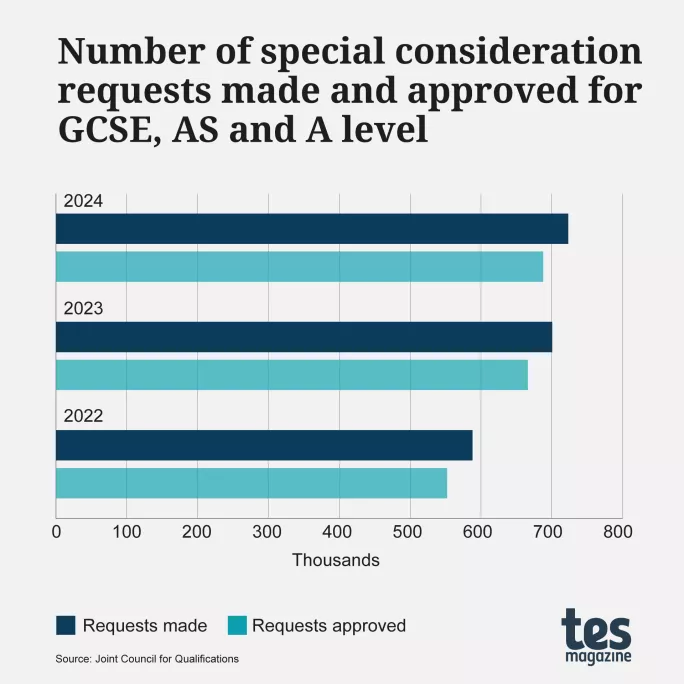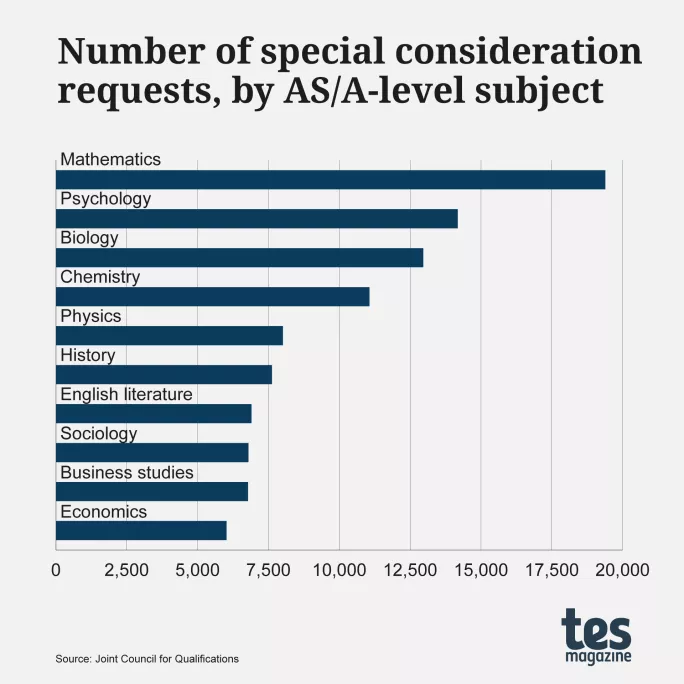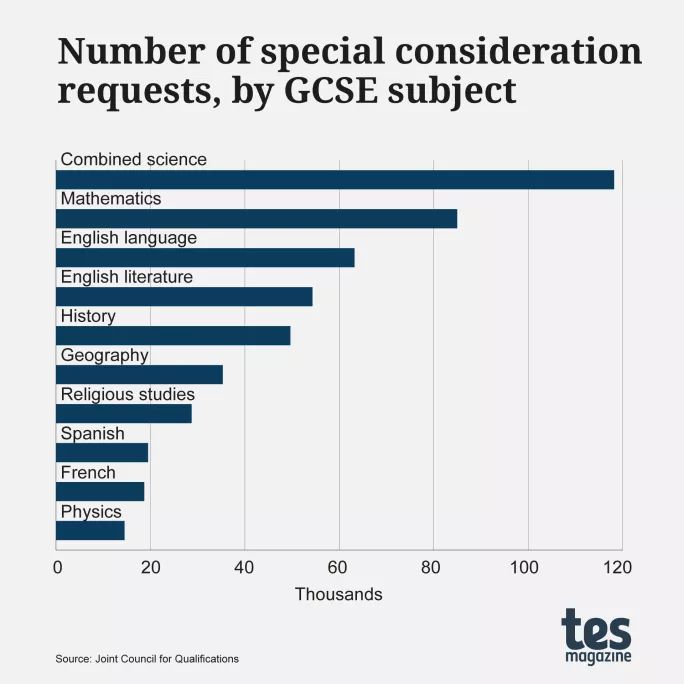
Special consideration requests 2024: 8 things schools need to know

Ofqual has published data revealing the number of special consideration requests that were submitted for GCSEs, AS and A levels this summer.
These are applications for adjustments to a student’s mark or grade, made after an assessment and owing to “exceptional circumstances” affecting their performance.
The Joint Council for Qualifications (JCQ) lists some of the reasons special consideration may be requested, such as illness, injury, bereavement, domestic crisis, serious disturbance during the exam, or failure by the centre to implement previously approved access arrangements.
Requests are submitted by schools or colleges to exam boards.
Here are the key points school leaders need to know:
1. More requests, but not a greater proportion of all assessments
The headline figure is that this year there were 723,220 special consideration requests across GCSE, AS and A levels. This is a 3 per cent increase on summer 2023.
However, this small increase is likely due to a rise in the number of assessments - itself due to a rise in student population numbers. This summer there were 16.7 million assessments marked, a 4.5 per cent rise from 16 million last year.

So, while last year 4.4 per cent of all assessments resulted in a special consideration request, this year that dropped slightly to 4.3 per cent. This means that as a proportion of assessments, there has been no increase in the number of special consideration requests.
This suggests some stability has come after disruption caused by the Covid-19 pandemic led to a 19 per cent rise in requests in the year to summer 2023, which was also a 19 per cent rise on 2019, the last year before the pandemic.
2. Approval rate remains the same
How successful were these requests? The data shows that 687,855 of the total number made were approved, which is 95.1 per cent.
This is the same percentage as last year, and is pretty consistent across GCSE requests and AS and A level requests, also as per last year.
- How to appeal a GCSE or A-level exam grade
- Grade boundaries: what are they and how do they work?
- A-level results: Disadvantage gap remains
3. Internal vs external assessments
As to be expected, the vast majority of requests related to external assessments.
In summer 2024, 98.5 per cent of requests were for external exams, while just 1.5 per cent related to internal assessments.
Again, this is very similar to last year, where 98.4 per cent and 1.6 per cent of requests were made for external and internal assessments respectively.
4. Maths leads the charge at A level
At AS and A level, the subject with the highest number of special consideration requests was maths, with 19,390 requests.
Ofqual points out that because special consideration requests are at component level, subjects with the most components are more likely to rank highly.

As, of course, are subjects with more entrants - and maths was once again this year’s most popular A level.
Psychology, biology and chemistry (the next three most popular A levels) came next, with 14,180, 12,965 and 11,065 requests respectively.
5. Popularity also persists at GCSE
At GCSE, the sciences also topped the subject table, with combined science receiving the highest number of special consideration requests at 118,210. Then came maths with 84,970.
Again following the list of most popular subjects at GCSE, English language came next with 63,220 requests, then English literature with 45,320 and history with 49,650.

6. Individual applications were most popular
Special consideration applications can be made on an individual or group basis. A group application may be appropriate when a number of students sitting the same exam are affected by the same issue, such as a fire alarm.
But the majority - 96.8 per cent - of applications are made for individuals, with just 3.2 per cent for groups. This is approximately in line with last year when 96.2 per cent were made for individuals.
Really getting into the small print now, the data also gives a breakdown of the size of the groups.
Most common, at 26.1 per cent of group applications (and just 0.8 per cent of all applications), were groups of two to five students, while 0.7 per cent of group applications (and less than 0.1 per cent of all applications) were for groups of 200 students or more.
7. Mark adjustments and qualification awards
It’s important to note that there are two different types of special consideration: mark adjustments and qualification awards.
Mark adjustments are for students who sat the assessment but did not demonstrate their best ability because of exceptional circumstances.
Meanwhile, qualification awards are for students who were absent from the assessment for reasons that meet JCQ’s eligibility criteria.
The vast majority of approved requests this year were for mark adjustments at 654,745 or 95.2 per cent of all requests. This is similar to last year.
8. Degrees of change
And finally, to what extent did marks change? According to JCQ guidelines, marks can be adjusted by up to 5 per cent of the maximum mark of a question paper.
This year, the most frequent adjustment was a 4 per cent change (28.4 per cent of adjustments).
Meanwhile, 28.1 per cent of adjustments were made at 3 per cent, 22.5 per cent at 2 per cent and 15.1 per cent of adjustments at just 1 per cent of the paper’s maximum marks.
Only 5.9 per cent of adjustments were made at the maximum of 5.9 per cent.
For the latest education news and analysis delivered every weekday morning, sign up for the Tes Daily newsletter
You need a Tes subscription to read this article
Subscribe now to read this article and get other subscriber-only content:
- Unlimited access to all Tes magazine content
- Exclusive subscriber-only stories
- Award-winning email newsletters
- Unlimited access to all Tes magazine content
- Exclusive subscriber-only stories
- Award-winning email newsletters
You need a subscription to read this article
Subscribe now to read this article and get other subscriber-only content, including:
- Unlimited access to all Tes magazine content
- Exclusive subscriber-only stories
- Award-winning email newsletters
- Unlimited access to all Tes magazine content
- Exclusive subscriber-only stories
- Award-winning email newsletters
topics in this article



